John Hurrell – 1 April, 2019
Although O'Neill's use of handicrafts is fascinating for its virtuosity mixed with community politics, and her use of personal and social history gripping, she really excels when she riffs on her method, exploring a playfulness by breaking down and reassembling technique—not knowing fully where it will lead.
Ani O’Neill is well known—and much admired—for her involvement with (and advocacy for) Cook Island handicrafts, particularly the traditional sewing, weaving, crocheting and knitting skills she learned from her grandmother. Classic Hits is a mini-survey show of the fabric-based work she has produced ever since she emerged as a precocious student in the early nineties, a sampling with a dozen ‘tracks’ that demonstrate her wit, love of fine detail, and fondness for anecdotal memory, especially in regard to her own childhood growing up in Auckland.
The varied but distinctive items presented here-sequenced in chronological order—lock in nicely with her contributions to Pacific Sisters currently displayed over in AAG, her personal (and culturally aligned) enthusiasms within apparel production readily detectable.
Most of O’Neill‘s works here are not single units, consisting of several discrete components, usually positioned in a line or a regular grid.
SQUAD SUITS (2004) presents a rack of shell suits worn by various artist friends during performances, each set of fluorescent jacket and trousers hanging on hangers, while ‘ei scrumbles (2002) presents on a plinth a row of small balls of shells from broken leis which have been crocheted into balled up nets using thin nylon. Each of the six clustered bundles has its own unique variety of shell and organisational arrangement.
In the wall work There is No Place Like Home (1998) we see seven individually coloured horizontal rows of knitted circles on a seven-by-seven grid—they look like glowing beer coasters. The colours seem to resemble those of the Cook Islands coat of arms.
Three squatting brown corduroy gods, based on carvings and stuffed with Dacron, balance on short legs and large extended penises as they greet visitors at the gallery entrance. The eyes and facial features of Tangaroa Tripdych (1992) are delineated through what is known as ‘oyster stitching’, and the shell shape of this ‘embroidered’ raised stitch-module is also rendered diagrammatically on a nearby yellow, lace-fringed, cushion cover: Sample an Oyster (1991).
On the column next to the Starkwhite staircase, O’Neill has attached several dozen knitted baby octopuses (Baby ‘Eke [2005-]), all soft and colourful as they clamber around, exuberantly decorating the vertical support. Their mother is sometimes seen in the AAG Collection.
YUM! (Re-chewed) (2019) is a site-specific installation that deals with memory, presenting a small girl’s formal dress (Sunday’s finest) made of nylon net curtain in a top floor window that overlooks Newton’s Pacific Island Church. On the nearby staircase landing is a row of bubble gum packets for visitors to sample, that chewy sweet being a bribe O’Neill’s family used (when she was small) to prevent her from fidgeting during the service. The work, a remake of a 1995 project, is a poetic comment on transience, control, and innocence, with the abandoned wrappers left by gallery-goers contrasting with the daylight streaming through the ethereal ‘angelic’ garment.
The two circular works from the ongoing Cottage Industry series (1997-) are crocheted paintings in the tondo tradition of Dashper and Rondinone, where shape, design, support and form merge. Because of the two colours they could be soft and woolly snare drum skins, a humorous reference to Dashper. With their shape, they might also be pompom-deprived tam o’ shanters.
Another reference to headwear (but less oblique) is My Hat (1993), a firmly rigid boater or cady, made in the style of a Cook Island rito hat. These are traditionally plaited from coconut tree leaf-fibres, but here O’Neill has used plastic curling ribbon.
The three metre high tivaevae—from 1994—like the hat, is part of the Cook Island ‘brand’ and this art genre usually has community participation. Looking at the (alluded to) continuing repeating patterns which the turquoise-framed fabric rectangle is a part of, lines of yellow-centred diamonds move vertically, while pink-centred ones move horizontally; and half-squares on the quilt’s sides in time (and imagination) join up. You can envisage it as a repeated module covering the whole gallery.
Although O’Neill’s use of handicrafts is fascinating for its virtuosity mixed with community politics, and her use of personal and social history gripping, she really excels when she riffs on her method, exploring a playfulness by breaking down and reassembling technique—not knowing fully where it will lead. For this reason, ‘ei scrumbles and Baby ‘Eke are the stand out works in this show. She lets the overt narrative collapse and new unexpected associations creep in the back door through a new abstraction. The manipulated materials seem to summon meanings according to their own will, not hers.
John Hurrell
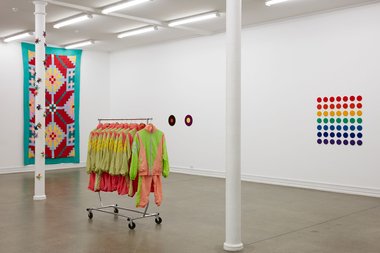
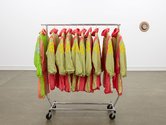
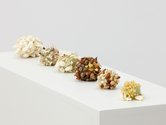














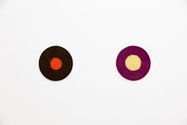





 Advertising in this column
Advertising in this column Two Rooms presents a program of residencies and projects
Two Rooms presents a program of residencies and projects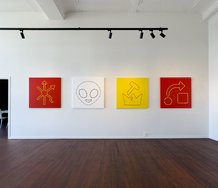
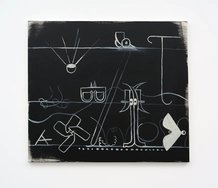
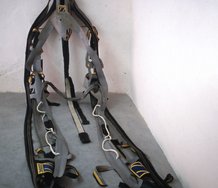
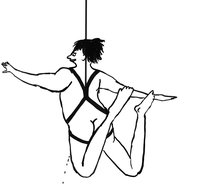
This Discussion has 0 comments.
Comment
Participate
Register to Participate.
Sign in
Sign in to an existing account.